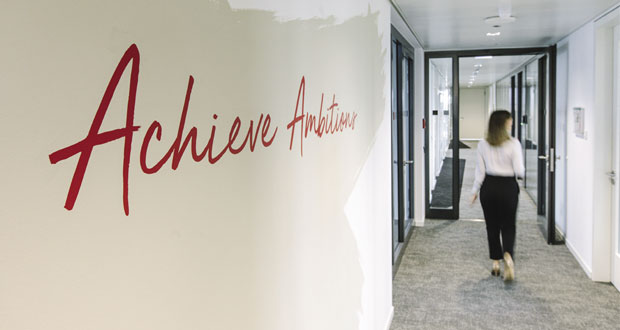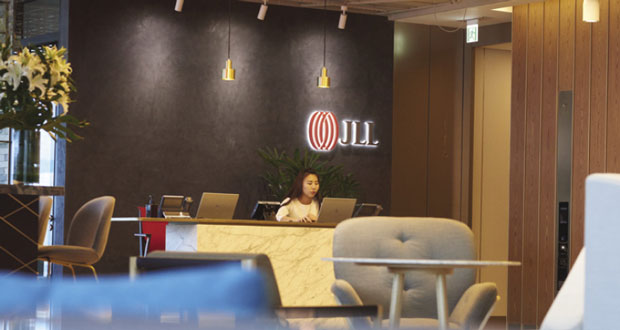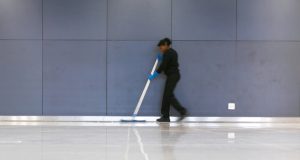DESIGN AND TECH CHANGE
According to Caskey, changing work patterns will inevitably influence the design of the workplace, most notably, while desking accounted for 60 to 70 per cent of space pre-COVID, that’s gone into reverse, with desking estimated to make up a third to 40 per cent. The remainder he estimates will be taken up with collaboration space, places for teams to gather and better-quality meeting rooms for team events.
“Sustainability is another priority factor for today’s companies. It is one of the long-lasting trends to come out of the last decade, as more companies commit to net zero carbon. When you consider that the built environment is estimated to account for approximately 36 per cent of global final energy consumption and nearly 40 per cent of total direct and indirect CO2 emissions, the role of corporate real estate in helping companies achieve net zero ambitions is crucial.
“As office design becomes more sustainable, better air quality, the measurement of carbon particles, a greater use of biophilia and improved lighting, will be a continuing trend in office design.”
Technology he adds will play an important part in the revisionist workplace. For instance, meeting rooms will be designed to engage teams in a virtual setting, and apps will be employed that can order services within buildings based on a touchless environment.
“The evolution of technology will continue as the built environment gets smarter and a more attractive place for people to come and work” says Caskey. “For example, there is a lot of thinking around how to design and manage the reception and security aspects of the workplace. We’re seeing a lot of the tech companies adopt a digital experience around registrations and notifications, but a human welcome is also fundamental to add to the experience, which is why I think there’ll be a mix of digital with the personal touch.”
Caskey also feels that with social distancing, occupant’s previous nervousness around the use of sensors has dissipated, as people embrace flexible workspace and desking.
“The innovation we’re seeing around sensors, and the amount of data they can gather gives us much more information than ever before. Sensors tracking occupancy levels has become less of an issue, and the innovation we’re now seeing around this technology and the data it can capture gives us far more information around the performance of a building. For example, JLL’s collaboration with GoSpace’s Artificially Intelligent Dynamic Resource Allocation engine (AIDRAT)(iii) helps us create a dynamic occupancy planning and management offering.”
NEW WAYS OF WORKING
Despite research(iv) suggesting the home is now competing with the workplace in terms of the quality of experience, Caskey believes that it’s more important for FMs to ensure that those at home feel engaged and part of the company.
“At JLL we’ve released a new offering ‘Experience / Anywhere(v)’ to enhance employee connectivity across the office, at home or anywhere that work happens, which includes health, wellness and engagement tools that help our corporates engage with employees wherever they work. There is access to an array of tools and techniques in the app. This illustrates how the level of innovation in technology has accelerated as we’ve gone through COVID.”
Brand new global JLL research has investigated the link between happiness, fulfilment and productivity, with a recent study finding that 24 per cent of employees now value ‘feeling connected to my colleagues’ as a top workforce priority, while 61 per cent of the workforce are craving ‘real’ human interactions with their co-workers.
The research(vi) also found that employees are now deprioritising aspects of work like salary and visibility for wellbeing support, work-life balance and colleague connection, which have all risen incrementally in importance since before the pandemic.
Explains Caskey: “In partnership with ART Health Solutions, we released findings of a four-month home working study which examined employee health and productivity since the start of lockdown in mid-March 2020. The key data findings underlined the relationship between homeworking environments and employee productivity and wellbeing. The data has also shown how important environment and mental health is for performance.”
The good news for FM he adds is that it is increasingly recognised by corporate leaders as a core element in the performance of businesses. If workplace is seen as a service, it marks a professional change from FMs being viewed only as site managers to that of creators of workplace experience.
Concludes Caskey: “Facilities managers, as directors and leaders are now responsible for the experience within the workplace that they manage. As offices reopen, organisations need to determine ‘what is the purpose of coming into the office?’ This will link to how organisations engage and lead their businesses into the future, which is as much of a leadership/business challenge as how corporate real estate and FM evolves to provide great experiences for their employees into the future.”
(i) www.jll.co.uk/en/trends-and-insights/workplace/what-companies-are-doing-about-work-from-home-fatigue
(iii) www.jll.co.uk/en/products/dynamic-op
(iv) www.fmj.co.uk/leesman-research-finds-the-home-is-outperforming-the-office-in-some-fundamental-areas/
(v) www.us.jll.com/en/products/experience-anywhere
(vi) www.jll.co.uk/en/trends-and-insights/research/worker-preferences-barometer






